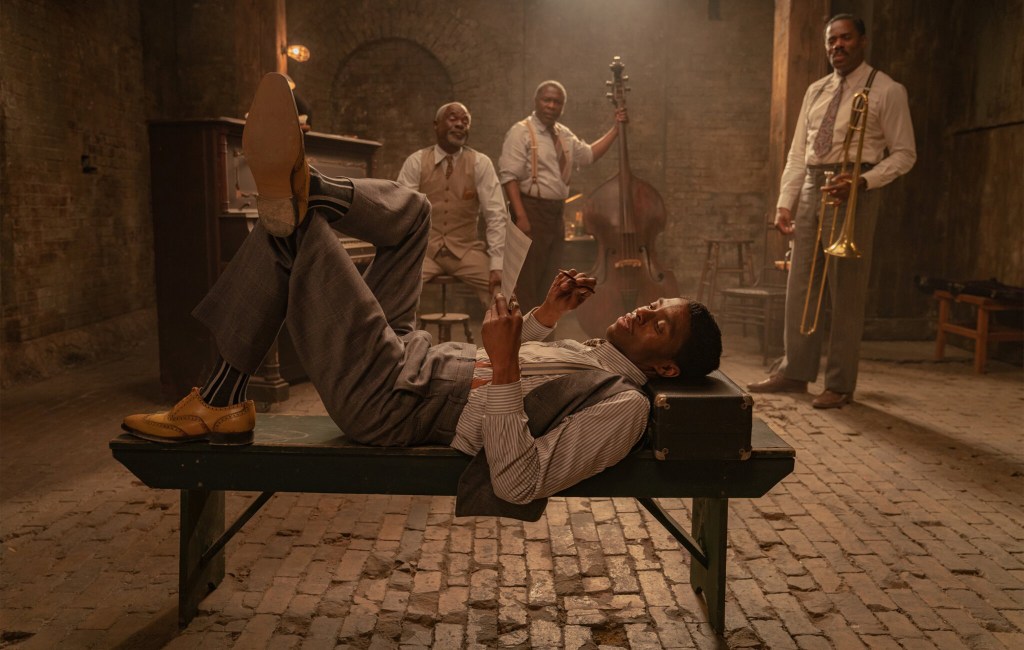Chicago, 1927. Welcome to a single recording session of Ma Rainey’s Black Bottom. Ma (Viola Davis) is running late, of course, cause she’s the star. The band is rehearsing in the “studio,” a dank basement room that’s not big enough for the egos it’s asked to contain. Levee the horn player (Chadwick Boseman) in particular is testing everyone’s nerves with his outsized ambitions and his new $11 shoes.
When Ma arrives, tensions mount. Levee is trying to rearrange her music, and she’s got to show him his place. But she’s also battling the (white) management, who are subtly trying to push her in different directions, disrespecting her status as the mother of the blues, trying to control a product they don’t fully understand. The other band members – Cutler (Colman Domingo), Toledo (Glynn Turman), and Slow Drag (Michael Potts) – try to run interference, but they know their place and are loathe to stray from it.
Ruben Santiago-Hudson adapts from August Wilson’s excellent play. You may know that Denzel Washington intends to bring all 10 of Wilson’s “century cycle” plays to screen, starting with Fences, for which David received an Oscar, and following this one with The Piano Lesson, for which he’ll cast his son, John David Washington. Of course, he wasn’t far off in casting Boseman for this one; Boseman was his longtime protégé; Washington had sponsored him at Howard University, paying his tuition so he could take Phylicia Rashad’s coveted acting class. Ma Rainey’s Black Bottom is Boseman’s last role. He was secretly receiving treatment for the colon cancer that killed him earlier this year while filming.
As far as legacy goes, Ma Rainey’s Black Bottom is about as good a final role as you can hope for. He’s magnetic, vital, crackling with suppressed rage, electrifying and dangerous. Opposite him, Viola Davis’s Ma can afford to be a little more confident, a little more sedate. Perhaps because of her career she has more experience dealing with the white man’s power struggle, but she holds her own, knows her worth and insists on it.
August Wilson’s play is urgent and alive (I personally prefer this one to Fences). Director George C. Wolfe does an excellent job of making us feel every inch of that tiny recording studio’s claustrophobic walls. It’s hot, it’s crowded, there is little room for maneuvering (physically and symbolically) and plenty of potential for mistakes. Egos and tempers are bouncing off each other in desperate and menacing ways. Meanwhile, the white managers and producers sit comfortably upstairs, dictating how the session will go, depriving even their star of a 5 cent bottle of Coke.
This recording session is a microcosm of the Black experience in America in the early 20th century. Generational trauma, informed by racism, religion and violence, is evident in every note sung in the blues, and white men stand by to monetize and profit from it. It is no wonder that this session may turn explosive at any moment, and very telling that when that escalating pressure so carefully cultivated finally does release, the lateral violence is just another heartbreaking blow to an already wounded community.



Boseman is fantastic in this. I was a bit surprised how much this movie was about Levee over Ma Rainey herself. But I really didn’t like the ending. That’s my biggest hurdle with it currently.
LikeLiked by 1 person
What a dance.🍮🍂🍮🍂
LikeLiked by 1 person
Reblogged this on The BIG ISMS and commented:
Generational trauma, informed by racism, religion and violence, is evident in every note sung in the blues, and white men stand by to monetize and profit from it.
A Must See and excellent review from Jay at Assholes Watching Movies
LikeLiked by 1 person
I’ve been hearing good things about this one.
LikeLiked by 1 person
Can’t wait to watch this one. Glad it is on Netflix so I don’t have to go anywhere to see it.
LikeLiked by 1 person
Tell me about it!
LikeLiked by 2 people